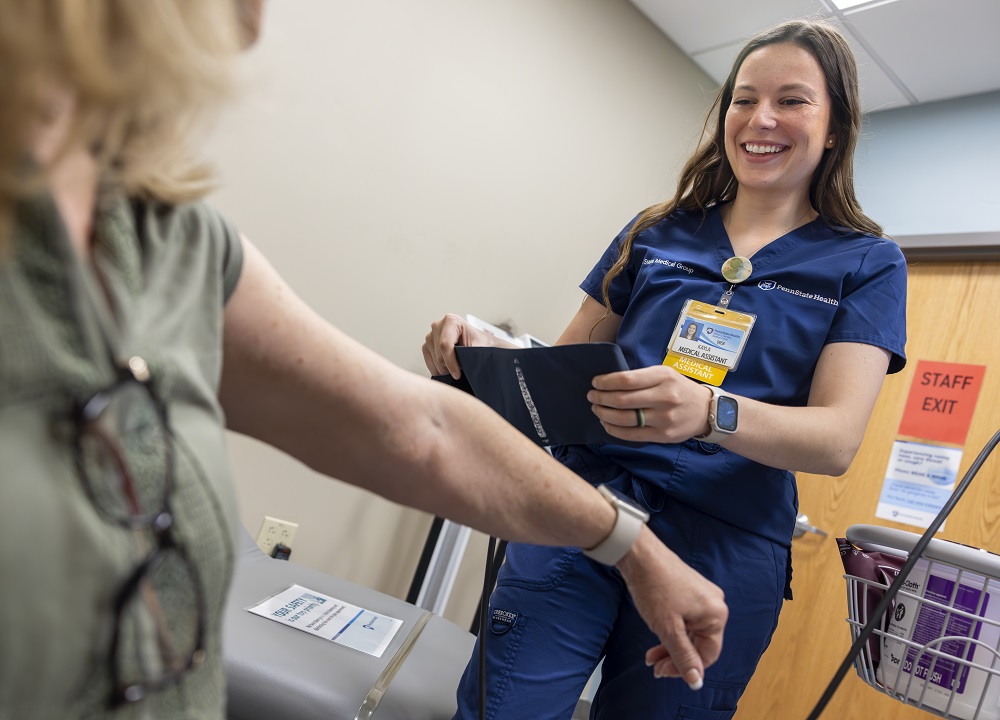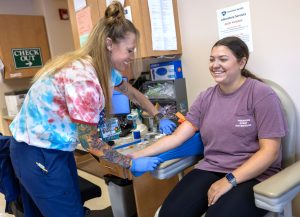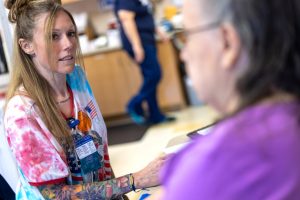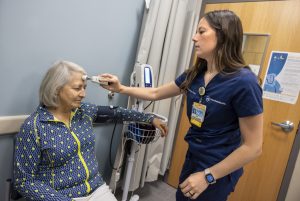Penn State Health medical assistants reveal rewards of their careers

Changing lives, finding fulfillment: Penn State Health certified medical assistants reveal rewards of their careers
When Kayla Bomgardner graduated from Annville-Cleona High School in 2019, she was uncertain about her future. Reluctant to invest in a four-year college without a clear career path, she considered working with children, leveraging her background as a competitive gymnast.
Her grandmother, Dottie Hunt, one of the most influential people in Bomgardner’s life, was a nurse. They had discussed the profession multiple times, and it seemed like an intriguing possibility. Bomgardner, though, preferred to get some experience and make some money before she settled on a career.
She learned HACC, central Pennsylvania’s community college, offered a nine-month course to become a certified medical assistant (CMA), an essential position that combines administrative duties, such as updating medical forms and scheduling appointments, with clinical ones, including preparing patients for exams and collecting lab specimens.
She could teach children’s gymnastic lessons part time while attending medical assistant classes.
“Once I actually got into the clinic setting and worked with patients hands-on, I found that I really, really loved it,” said Bomgardner, who has worked for three years as a certified medical assistant at Cocoa Outpatient Clinic in Hershey.

Jodi Bracken, a medical assistant at Penn State Health Medical Group – Cornerstone, prepares to draw blood from Emily Bromirski during her appointment on Friday, July 26, 2024.
Now 23, Bomgardner works as a CMA while attending school again, this time for her associate degree in nursing. Her ultimate plan, with financial assistance from Penn State Health, is to earn her Bachelor of Science in Nursing.
“Medical assisting is a great steppingstone for a lot of people like me,” Bomgardner said. “I wanted to be able to finish a program and start working and have that financial help. I think a lot of people are realizing that and the job stability being a medical assistant carries.”
Growth and opportunity in medical assisting
The U.S. Bureau of Labor Statistics projects a 14% growth in medical assistant positions by 2032, outpacing both general employment and other medical fields. The demand is driven by an aging population and expansion in health care facilities.
This includes Penn State Health which has opened multiple hospitals in the last five years and has more than 90 outpatient locations across 10 counties.
The bureau estimates there will be nearly 115,000 openings per year nationwide throughout this decade due to newly created positions, anticipated retirements and the current trend of medical assistants using their experiences as a springboard to other health careers.
A lifelong career or a steppingstone
Jodi Bracken has worked as a CMA for 18 years. When she joined Penn State Health Medical Group – Cornerstone in Lititz more than four years ago she expected to continue working in the profession for the rest of her career.
“It’s a wonderful field. The fulfillment that you get from it, from the patients, is something that you don’t really get from other places,” Bracken said. “What you’re doing is something that literally changes people’s lives.”
As her career developed at Cornerstone, it became abundantly clear that what she enjoyed most was advocating for people, especially those dealing with difficult life experiences. About 18 months ago, she decided to pursue her Bachelor of Science degree in criminal justice and criminal psychology.

Jodi Bracken, a medical assistant at Penn State Health Medical Group – Cornerstone, gathers patient information during an appointment.
Her goal is to work with women and children who are victims of crime, including human trafficking. As part of its Total Rewards benefits, Penn State Health provides tuition assistance for full-time employees to pursue postsecondary education, no matter the discipline of study.
“Penn State Health doesn’t lock you into a certain major. I get tuition assistance in any furthering education, which you don’t see anywhere else,” she said. “The education, knowledge and experience I’ve gained in the last 22 years in the health field, and from working here, will help me on the path I’m going.”
A day in the life of a medical assistant
No two days are the same for a medical assistant. “This isn’t a job where you sit,” Bracken said. “There isn’t a dull moment. It’s mentally and physically busy.” Medical assistants are often the first point of contact for patients, setting the tone for their visit.
“I’ll pick them up from the waiting room and bring them back to the exam room. I’ll get their vitals. I’ll do their check-in and get all of their medical history. I kind of set the appointment before the provider comes in,” Bomgardner said. “It’s very important, because it could either make the patient’s experience really good or it could make it really bad.”
Bracken agrees that a medical assistant’s attitude can go a long way to creating a positive environment for patients. Sure, she’ll present stickers to brave 3-year-olds. She also gives stickers to brave 90-year-olds.
“We have patients who come in here and are being seen for an array of things, and you don’t know what they’re facing,” Bracken said. “They may need the smile on your face more than you realize. And by giving them that, they may leave in a completely different mental space than when they came in.”

Kayla Bomgardner, a certified medical assistant at Cocoa Outpatient Clinic, checks a patient’s temperature during a routine exam.
That desire to spread happiness is what has led Bracken to start the Internal Joy Committee at Cornerstone. She’s known for her elaborate costumes – a queen one Halloween in which she wore a tutu and tiara and brandished a wand, a full Cindy-Lou Who getup during Christmas. Whether it’s Crazy Socks Week or she is just in a tutu mood, Bracken said patients enjoy the goofy atmosphere and friendly face.
“This makes me happy,” she said, “to make others smile and know that they look forward to the fun we have here.”
Bomgardner, the former gymnastics instructor, thought she would work in pediatrics as she advanced in her medical career. Instead, she’s been inspired by her meaningful interactions with elderly patients and now plans to specialize in geriatric care.
“They have so much life and knowledge, and they’re so fun to work with,” she said. “They are in a very vulnerable spot when they come to see us. So, making sure they are feeling safe and comfortable is a huge responsibility. But it’s also something that has been amazing.”
Ready to make a difference?
If you’re a people person who loves providing exceptional patient care, a career as a medical assistant could be your calling. Penn State Health is offering a $3,000 signing bonus to qualified candidates.
Apply now
If you're having trouble accessing this content, or would like it in another format, please email Penn State Health Marketing & Communications.
